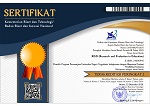Curriculum evaluation of French learning in senior high school
DOI:
https://doi.org/10.21831/reid.v6i1.28006Keywords:
curriculum evaluation, countenance model, French learningAbstract
The research aims to describe the implementation of French language learning in high schools of Sleman Regency viewed from the components of planning, implementation, and results. This evaluation research uses a quantitative descriptive approach with a countenance model from Stake. Respondents in this research were teachers and students at three senior high schools. Data collection techniques used in this study include research lesson plans, questionnaires, and documentation. The results of this research indicate that: (1) in the planning component, the quality of lesson plan preparation is very good and needs to be maintained because in the lesson plan review, the results obtained are 88.9% and the teacher questionnaire results of 26.6 are included in the excellent category; (2) in the implementation component, it has good results with the acquisition of a total score of 77 and a student questionnaire of 66.19; (3) in the component of the results, good results are obtained with an average value of students that is 86.38 and the results of the teacher questionnaire of 65.7 which is above 61 so that it falls into the good category. Student scores are obtained from the results of the middle semester assessment and teacher questionnaire.
References
Abrory, M., & Kartowagiran, B. (2014). Evaluasi implementasi Kurikulum 2013 pada pembelajaran matematika SMP negeri kelas VII di Kabupaten Sleman. Jurnal Evaluasi Pendidikan, 2(1), 50–59. Retrieved from http://journal.student.uny.ac.id/ojs/index.php/jep/article/view/73
Anh, V. T. K. (2018). Evaluation models in educational program: Strengths and weaknesses. VNU Journal of Foreign Studies, 34(2), 140–150. https://doi.org/10.25073/2525-2445/vnufs.4252
Arifin, Z. (2011). Konsep dan model pengembangan kurikulum. Bandung: Remaja Rosdakarya.
Arikunto, S. (2018). Evaluasi program pendidikan. Jakarta: Rineka Cipta.
Azwar, S. (2018). Reliabilitas dan validitas (4th ed.). Yogyakarta: Pustaka Pelajar.
Dewantara, I. P. M. (2017). Stake evaluation model (Countenance model) in learning process Bahasa Indonesia at Ganesha University of Educational. International Journal of Language and Literature, 1(1), 19–29. https://doi.org/10.23887/ijll.v1i1.9615
Dí¼ndar, E., & Merí§, A. (2017). A critical review of research on curriculum development and evaluation in ELT. European Journal of Foreign Language Teaching, 2(1), 136–168. https://doi.org/10.5281/zenodo.437574
Hamalik, O. (2008). Manajemen pengembangan kurikulum. Bandung: Remaja Rosdakarya.
Hasan, S. H. (2009). Evaluasi kurikulum. Bandung: Remaja Rosdakarya.
Ismail, F. (2015). The evaluation of curriculum implementation at Tarbiyah Faculty IAIN Raden Fatah Palembang. JISAE: Journal of Indonesian Student Assessment and Evaluation, 1(1), 12–27. https://doi.org/10.21009/JISAE.011.02
Johnson, R. B., & Christensen, L. (2000). Educational research: Quantitative, qualitative, and mixed approaches. Thousand Oaks, CA: SAGE Publications.
Kurniawan, R., Winarno, M. E., & Dwiyogo, W. D. (2018). Evaluasi pembelajaran Pendidikan Jasmani, Olahraga, dan Kesehatan pada siswa SMA menggunakan model Countenance. Jurnal Pendidikan: Teori, Penelitian, Dan Pengembangan, 3(10), 1253"”1264. https://doi.org/10.17977/jptpp.v3i10.11599
Lai, M., & Kushner, S. (Eds.). (2013). A developmental and negotiated approach to school self-evaluation. https://doi.org/10.1108/S1474-7863(2013)14
Lukum, A. (2015). Evaluasi program pembelajaran IPA SMP menggunakan model Countenance Stake. Jurnal Penelitian Dan Evaluasi Pendidikan, 19(1), 25–37. https://doi.org/10.21831/pep.v19i1.4552
Majid, A., & Rochman, C. (2014). Pendekatan ilmiah dalam implementasi kurikulum 2013 (E. Kuswandi, ed.). Bandung: Remaja Rosdakarya.
Mardapi, D. (2017). Pengukuran, penilaian, dan evaluasi pendidikan (2nd ed.). Yogyakarta: Parama Publishing.
McCormick, R., & James, M. (2019). Curriculum evaluation in schools. London: Taylor & Francis.
Prasojo, L. D., Kande, F. A., & Mukminin, A. (2018). Evaluasi pelaksanaan standar proses pendidikan pada SMP Negeri di Kabupaten Sleman. Jurnal Penelitian Dan Evaluasi Pendidikan, 22(1), 61–69. https://doi.org/10.21831/pep.v22i1.19018
Priyatno, D. (2009). 5 Jam belajar olah data dengan SPSS 17 (J. Widiyatmoko, ed.). Yogyakarta: Mediakom.
Regulation of the Minister of Education and Culture No. 103 of 2014 on Lerning in Primary and Secondary Education. , (2014).
Regulation of the Minister of Education and Culture No. 22 of 2016 on the Process Standard of Primary and Secondary Education. , (2016).
Regulation of the Minister of Education and Culture No. 4 of 2018 on the Assessment of Learning Outcomes by the Educational Unit and the Government. , (2018).
Retnawati, H. (2014). Analisis kuantitatif instrumen penelitian. Yogyakarta: Parama Publishing.
Sarjono, H., & Julianita, W. (2011). SPSS vs LISREL: Sebuah pengantar, aplikasi untuk riset. Jakarta: Salemba Empat.
Schiro, M. S. (2017). Teori kurikulum: Visi-visi yang saling bertentangan dan kekhawatiran tanpa henti (B. Sarwiji, ed.; E. Sulistyowati, trans.). Jakarta: Indeks.
Sorenson, R. D., Goldsmith, L. M., Méndez, Z. Y., & Maxwell, K. T. (2011). The principal's guide to curriculum leadership. Thousand Oaks, CA: Corwin Press.
Sumual, M. Z. I., & Ali, M. (2017). Evaluation of primary school teachers' pedagogical competence in implementing curriculum. Journal of Education and Learning, 11(3), 343–350.
Tyler, R. W. (2013). Basic principles of curriculum and instruction. Chicago, IL: University of Chicago Press.
Downloads
Published
Issue
Section
License
The authors submitting a manuscript to this journal agree that, if accepted for publication, copyright publishing of the submission shall be assigned to REiD (Research and Evaluation in Education). However, even though the journal asks for a copyright transfer, the authors retain (or are granted back) significant scholarly rights.
The copyright transfer agreement form can be downloaded here: [REiD Copyright Transfer Agreement Form]
The copyright form should be signed originally and sent to the Editorial Office through email to reid.ppsuny@uny.ac.id

REiD (Research and Evaluation in Education) by http://journal.uny.ac.id/index.php/reid is licensed under a Creative Commons Attribution-ShareAlike 4.0 International License.






.png)




